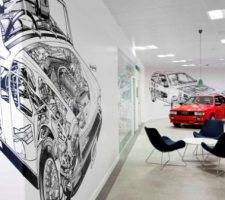November 13, 2014
Case Study: AutoTrader motors into its new Manchester digital playground
 Even in the context of a rapidly declining print market, the decision to end AutoTrader’s 37-year history as a printed magazine was not an easy one to take. At its height, Auto Trader had a circulation of 368,000, but in June 2013 the final printed copy rolled off the presses and the business began its new incarnation as a purely digital platform. Of course, this transformation was a long time in the making and had actually begun ten years earlier. By the time the print room lights went out, all of Auto Trader’s revenues had not only migrated online, but experienced significant growth too. It is Auto Trader’s growth during this process of transformation that is considered so unique in the publishing world and is proof that the business’ aspiration to be at the forefront of the digital marketplace is not just a wide-eyed intention. The website boasts 11.5million unique users, carrying out more than 140 million searches across mobile, table and desktop devices and the business is set to launch an extensive TV advertising campaign on boxing day.
Even in the context of a rapidly declining print market, the decision to end AutoTrader’s 37-year history as a printed magazine was not an easy one to take. At its height, Auto Trader had a circulation of 368,000, but in June 2013 the final printed copy rolled off the presses and the business began its new incarnation as a purely digital platform. Of course, this transformation was a long time in the making and had actually begun ten years earlier. By the time the print room lights went out, all of Auto Trader’s revenues had not only migrated online, but experienced significant growth too. It is Auto Trader’s growth during this process of transformation that is considered so unique in the publishing world and is proof that the business’ aspiration to be at the forefront of the digital marketplace is not just a wide-eyed intention. The website boasts 11.5million unique users, carrying out more than 140 million searches across mobile, table and desktop devices and the business is set to launch an extensive TV advertising campaign on boxing day.
























November 7, 2014
Orgatec 2014 focuses on collaboration, quiet and wellbeing in the workplace
by Anna King • Comment, Events, Furniture, Workplace design
Anna King reports from the biennial office furniture and interiors fair Orgatec, which took place recently in Cologne: Collaboration seemed to be king once again at this year’s Orgatec trade fair in Cologne, so much so that you’d be hard pressed to find a conventional workstation amongst the thousands of products on display. Even ergonomic task chairs in the traditional sense were thin on the ground. Senator’s offering was typical in its focus on collaborative work and the provision of work settings. As well as the Ad-Lib Scholar range for educational establishments, it presented the Ad-Lib Work Lounge multipurpose chair, both the work of British design studio PearsonLloyd. This upholstered model complete with headrest is available on glides or castors so it can slot into a multitude of workplace scenarios. Shown in some rich shades such as moss green and turquoise, it comes complete with a fold-down worksurface for brainstorming or other group working.
(more…)